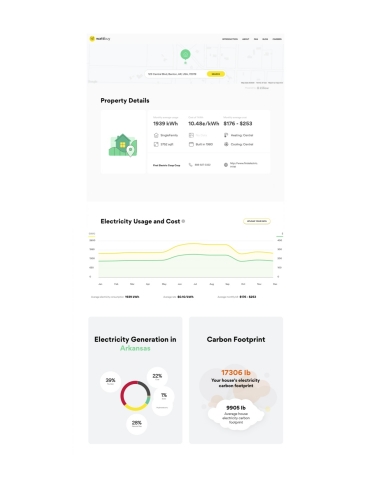WattBuy Launches Electricity Cost, Carbon Footprint Calculator for Nearly Every Home in the U.S.
WattBuy Launches Electricity Cost, Carbon Footprint Calculator for Nearly Every Home in the U.S.
First of its kind database helps consumers predict a home’s electricity cost and environmental impact
SEATTLE--(BUSINESS WIRE)--WattBuy, an energy intelligence service that empowers real estate companies, homeowners, and renters by providing comprehensive data on electricity usage and costs, has launched the first tool that estimates the electricity cost and carbon footprint impact for nearly every home in the United States. Visitors to wattbuy.com can enter an address to receive a month-by-month estimate of the home’s cost for electricity based on its average monthly electricity consumption along with a corresponding amount of annual carbon dioxide (CO₂) emissions created by the home’s electricity usage.
WattBuy’s electricity estimation calculator incorporates U.S. Energy Information Administration residential electricity usage data at a sub-state level, along with building profile correlations from the Lawrence Berkeley National Laboratory’s Building Performance Database. It also incorporates building characteristics from Zillow as well as individual county assessment data to determine specific housing characteristics. WattBuy provides this address-level information for nearly every single family home, many townhomes and condominiums, and some multifamily apartment buildings.
“The ability to provide this level of detail for electricity cost and usage for any address is an incredibly powerful tool for consumers,” said WattBuy co-founder and CEO Naman Trivedi. “For the first time, anyone can access this information to understand how much they’d potentially pay for electricity for that new home they’re considering purchasing or how much CO₂ the home produces.”
To come up with these calculations, WattBuy incorporates several open and proprietary data sources including recent hourly temperature and weather data from Dark Sky, climate data for historical trends from a typical meteorological year from the U.S. Department of Energy Open Energy Data catalog and several other proprietary data sets. This data is then used to build a gradient boosting machine learning model that takes location, building characteristics, and weather data as inputs, and returns an hourly electricity usage prediction.
“With this electricity usage prediction, we can then calculate a home’s carbon footprint using standard CO₂ byproduct values for each kilowatt-hour of electricity produced based on the fuel sources for that state, providing the simplest way to determine the carbon footprint of nearly every home in the U.S.,” said Ben Hood, Ph.D., WattBuy’s chief technology officer. “Consumers can use these insights to choose cheaper, greener electricity options and make individual decisions around solar rooftops or other energy efficiency improvements that can have a positive impact on reducing a home’s carbon impact.”
WattBuy is also making a scalable version of this data available to enterprise customers via an API.
About WattBuy
WattBuy makes taking charge of your electricity easy, transparent and trustworthy. The company’s personalized recommendation engine helps residents living in states with electricity choice save hundreds of dollars each year on their electricity bill by choosing a cheaper, greener electricity provider. Just search your address, compare plans, choose the one that’s right for you, and save money. For more information about WattBuy, please visit https://wattbuy.com/.
Contacts
Steve Smith
Voxus PR, on behalf of WattBuy
425.753.1653
ssmith@voxuspr.com
